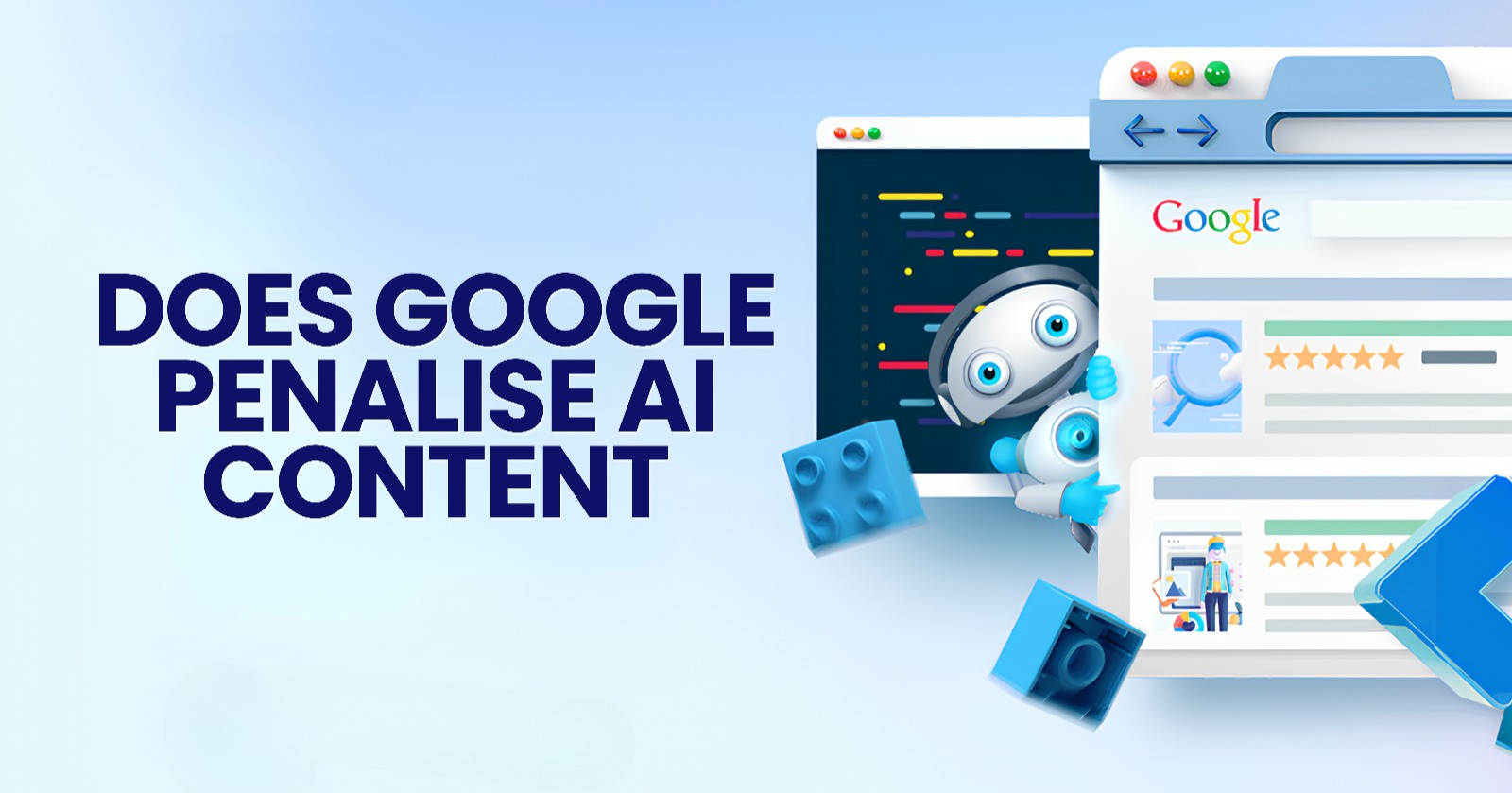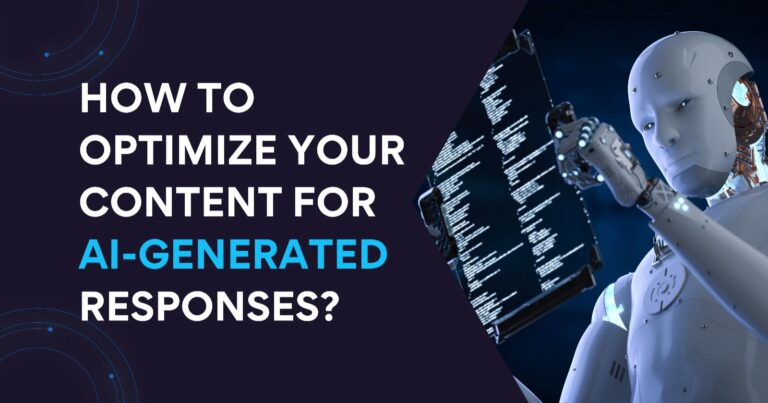Content created by AI is a hot topic nowadays. Just like any other task, you could put artificial intelligence to work to produce blogs, articles, assignments, and even complete websites with minimal effort. Many AI writing tools like ChatGPT, Jasper, and DeepSeek are already widely used by people and businesses in their respective industries to generate content. However, this convenience brings forth a major question: Does Google penalise AI content?
For years, Google has stressed the need for high-quality and user-focused content. The search giant continuously updates its algorithms to prevent misinformation, spam, and low-quality content from reaching search results. This is why the rapid advancement of AI-generated content has made many website owners and digital marketers concerned. Nowadays, website owners have to make sure that the content they post complies with Google’s content guidelines.
In this blog, we will discuss Google’s point of view on AI-generated content, factors that can lead to penalties, and the best practices of employing AI for content creation while staying true to Google’s quality benchmarks.
What is Google’s stance on AI content?
Google has made it clear that content created with AI does not go against its guidelines. Multiple official statements and blog posts throughout 2024 show that the search giant reiterated that its main concern is not how the content is created but rather its quality, relevance, and usefulness. It has continuously emphasised the need to avoid indulging in manipulative practices, such as keyword stuffing, cloaking, or engaging in link schemes.
Google claims that AI-generated content must meet the same quality standards as human-generated content. In other words, the AI-generated content must be original, informative, and valuable to the reader. Moreover, Google has cautioned users against using AI tools for the development of content that is low quality, spammy in nature, or misleading, as such practices can lead to penalties or low rankings.
Hence, by prioritising the needs and expectations of the target audience and following the guidelines set by Google. Website owners and content creators can use AI technology to engage their audience while maintaining a strong online presence.
How does Google detect AI content?
Google has not specifically stated that it can for sure identify AI-generated content, but the company has hinted that it can detect certain patterns and characteristics that are associated with AI-generated content and text. These factors include checking the writing style and tone of the text, finding factual inaccuracies, or unusual word choice. It uses sophisticated algorithms, like the SpamBrain AI system, to check low-quality and spam content. Here are some common ways that Google detects AI content:
- Repetitive Patterns: AI-generated content can create unnatural patterns that are not similar to human-written text.
- Keyword Stuffing: Some AI tools can overdo the use of keywords to rank higher, which is considered spam by Google.
- Lack of originality: AI may use the same information again and again without adding any unique insights to the content. This is another sign of AI-generated content for Google.
- Poor Readability: AI content that sounds awkward and robotic because of repetitive phrases is flagged by Google at once.
- Thin Content: AI content that lacks depth can be ranked as thin content and will not rank well.
However, it is important to remember that as AI and machine learning technologies continue to develop and create more AI content, it will become difficult to differentiate between human content and AI-generated content.
Looking for SEO Services?
Our SEO experts will boost your rankings, drive traffic, and increase conversions.
Get Found. Get Leads. Get Sales.
Book a ConsultationHow does Google penalise AI content?
The development of AI language models, such as GPT-4 and more, has made them more capable of producing high-quality and user-friendly content. Moreover, businesses and companies are adopting AI to help them with tasks like using ChatGPT for keyword research, data analysis and sales forecasting. This is one of the major reasons why Google has had to update its strategies for evaluating content and provide clear guidelines for AI-generated content.
However, Google does not penalise content for being AI. Actions are taken if the content is bad, spreads misinformation, or is of low quality. Hence, here is how Google penalises content that is spam or inaccurate:
1. AI-Generated Spam
If someone uses AI to create tons of low-quality articles with the sole aim of tricking Google into ranking their site higher, then it’s really easy for Google to catch it and apply penalties against them.
Example: Just think of creating hundreds of articles on a website which don’t make sense, are poorly written, and are stuffed with irrelevant keywords. Google will see this as spam and push it down the search results.
2. Plagiarised or Duplicate Content
If AI copies content from other websites without adding any new information or insights, then Google will apply its penalty. Google values original content and will consider this plagiarised.
Example: An AI tool takes an article from another site, changes a few words and republishes it as new work. Google will see this as stealing.
3. Lack of E-E-A-T (Experience, Expertise, Authoritativeness, Trustworthiness)
Google wants the content published online to be trustworthy, accurate, and helpful for people. If it sounds unprofessional, misleading, or inaccurate, then Google will not rank it well.
Example: An AI tool writes a medical blog but does not cite references well or gets the facts wrong. This will appear low-quality and will not be displayed online. Hence, Google will apply its penalty.
4. Clickbait or Misleading Content
Some AI tools write flashy headlines or titles of articles that promise something, but when users click them, they do not live up to the expectation or are misleading to other spam websites. Google is against deceptive content and will penalise it.
Example: If an online article says “Lose 10 Pounds in 1 Day” but talks about regular fitness tips, then this would be misleading, and Google will not rank it well.
How can you avoid Google penalties with AI content?
You can avoid Google’s penalties with AI content by following the best practices, which are the following:
- Use AI as an assistant, not a replacement for human writing or creativity. They should be used to help with content creation and provide consistency. You must always review, edit, and add unique insights to the AI-generated content.
- Always ensure that the content is high-quality and follows the best SEO practices. It should be useful and informative, with expert opinions, case studies, and original data. If it is of low quality or includes keyword stuffing, then it can be penalised by Google.
- Continuously update your content with new information and insights. This can improve rankings as AI-generated content can quickly become outdated. Additionally, make sure that your content follows Google’s E-E-A-T guidelines, as this can boost your credibility.
- AI can create content quickly, but it can lack the emotional intelligence and creativity that is needed in content. Hence, always have a human editor to make changes and improve the quality and authenticity of the work.
- Google places a special focus on user experience. Website owners must make sure that the content is engaging, easy to read, and gives real value to the audience. Other factors that affect user experience are page speed, mobile-friendliness, and interactivity.
Final thoughts
Artificial intelligence apps and tools are great for speeding up the process of content creation, but AI writing in itself is not a replacement for human writing. Google, however, does not penalise anything that is generated by AI as long as it is high-quality, original, and user-friendly. The major points here are value, originality, and credibility.
You must use AI with great care, but you must try to humanise your work or content to get the best results. The best way to use AI content is to combine it with your own creativity and personal expertise. As long as the best practices of using AI and Google’s guidelines are observed, AI-generated content will promote a higher ranking with no risk of it being penalised.


